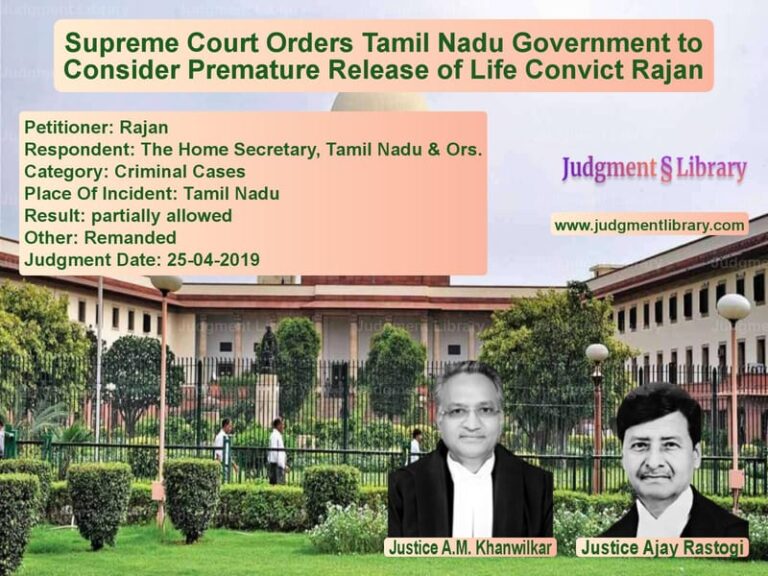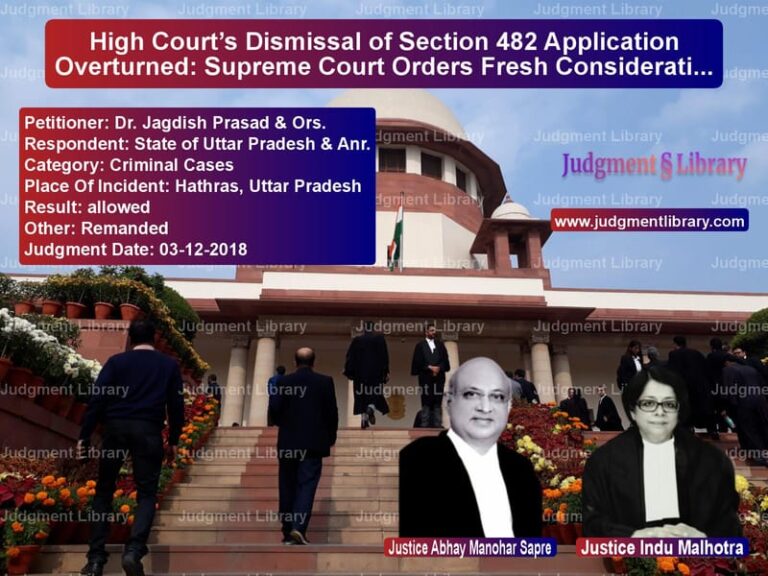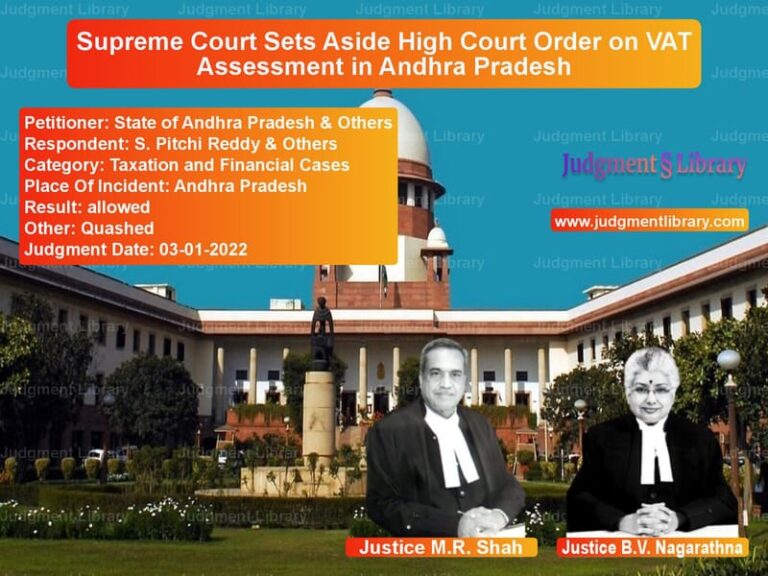Daughters’ Right to Coparcenary Property Upheld: Landmark Hindu Succession Act Ruling
Petitioner Name: Danamma @ Suman Surpur & Anr.Respondent Name: Amar & Ors.Judgment By: A.K. Sikri, JusticeAshok BhushanJudgment Date: A.K. Sikri, JusticeAshok Bhushan
The Supreme Court of India, in its judgment dated February 1, 2018, ruled in favor of the appellants, two daughters of a Hindu joint family, clarifying the application of the Hindu Succession (Amendment) Act, 2005. The case, Danamma @ Suman Surpur & Anr. vs. Amar & Ors., dealt with the right of daughters in coparcenary property and whether they are entitled to equal inheritance as sons, even if born before the enactment of the Hindu Succession Act, 1956.
The ruling significantly impacts Hindu inheritance law, reinforcing gender equality in coparcenary rights and strengthening daughters’ claims to ancestral property.
Background of the Case
The appellants, Danamma and Suman, are daughters of Gurulingappa Savadi, the propositus of a Hindu joint family. He had two sons, Arunkumar and Vijay, and a widow, Sumitra. After his death in 2001, his grandson Amar, son of Arunkumar, filed a suit seeking partition of the family’s properties, claiming that only the sons and widow were coparceners and that the daughters had no right to the ancestral property.
The key legal questions before the Court were:
- Whether daughters born before 1956 (when the Hindu Succession Act came into force) were entitled to coparcenary rights.
- Whether the 2005 amendment to the Hindu Succession Act granted daughters rights by birth, similar to sons.
- Whether daughters were entitled to equal shares in ancestral property upon the death of their father, regardless of their date of birth.
Legal Proceedings and Rulings
The trial court ruled against the daughters, holding that since they were born before 1956, they could not be considered coparceners. The High Court upheld this view, reasoning that the 2005 amendment did not apply retrospectively to daughters born before 1956. Aggrieved by this decision, the daughters appealed to the Supreme Court.
Petitioner’s Arguments (Danamma & Suman)
The appellants contended:
“The Hindu Succession (Amendment) Act, 2005 grants equal rights to daughters by birth, just as sons. The High Court erred in denying them their rightful share in ancestral property.”
Their arguments included:
- The 2005 amendment applies to all daughters, regardless of their birth date.
- Since their father died in 2001, the property should have been partitioned according to the amended law.
- Gender discrimination in inheritance rights violates constitutional principles of equality.
Respondent’s Arguments (Amar & Others)
The respondents, representing the sons and grandson of the deceased, argued:
“The amendment does not apply retrospectively. Daughters born before 1956 cannot be treated as coparceners.”
Their primary claims were:
- The law at the time of the father’s death should determine inheritance rights, not subsequent amendments.
- The daughters had already received dowry and had relinquished their rights in the property.
- Partition had effectively taken place before the 2005 amendment.
Supreme Court’s Judgment
The Supreme Court ruled in favor of the daughters, stating:
“The amendment applies to all daughters, whether born before or after 1956, provided the father was alive when the amendment came into effect.”
The key findings of the Court were:
- Daughters, like sons, have an equal right to ancestral property by birth.
- The 2005 amendment is retrospective in the sense that it applies to daughters regardless of birth date, as long as the partition had not been completed before December 20, 2004.
- Women cannot be deprived of their coparcenary rights due to outdated gender biases in inheritance law.
The Court emphasized that the objective of the amendment was to eliminate gender discrimination and promote equality in Hindu inheritance law.
Impact of the Judgment
- Ensures Equal Rights: The ruling affirms that daughters are equal coparceners in Hindu families.
- Prevents Discrimination: The judgment eliminates gender bias in succession laws.
- Applies to Pending Cases: The ruling benefits all daughters in similar legal battles for inheritance.
Conclusion
The Supreme Court’s decision in Danamma @ Suman Surpur & Anr. vs. Amar & Ors. is a landmark judgment affirming daughters’ rights to ancestral property under Hindu law. It strengthens gender equality and ensures that women receive their fair share of coparcenary property, regardless of when they were born. This ruling sets a precedent for future inheritance disputes and reinforces India’s commitment to equal property rights.
Don’t miss out on the full details! Download the complete judgment in PDF format below and gain valuable insights instantly!
Download Judgment: Danamma @ Suman Surp vs Amar & Ors. Supreme Court of India Judgment Dated 31-01-2018.pdf
Direct Downlaod Judgment: Direct downlaod this Judgment
See all petitions in Property Disputes
See all petitions in Succession and Wills
See all petitions in Landlord-Tenant Disputes
See all petitions in Judgment by A.K. Sikri
See all petitions in Judgment by Ashok Bhushan
See all petitions in allowed
See all petitions in supreme court of India judgments January 2018
See all petitions in 2018 judgments
See all posts in Civil Cases Category
See all allowed petitions in Civil Cases Category
See all Dismissed petitions in Civil Cases Category
See all partially allowed petitions in Civil Cases Category







